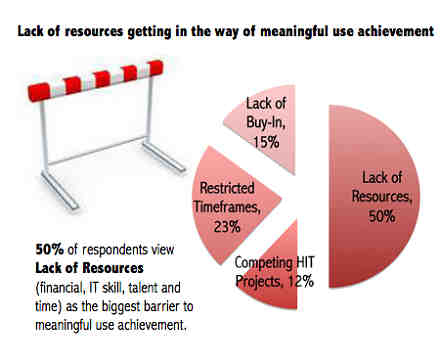The Stoltenberg Blog
Healthcare IT insights for competitive value-based care strategy
Overcoming Barriers to Meaningful Use Achievement
By Stoltenberg Consulting
What are the barriers holding organizations back from achieving Meaningful Use? The majority of responses to the Health IT Outlook Survey indicated the biggest barrier as a lack of resources (50%) while other responses noted restricted timeframes (23%), lack of buy-in from the organization (15%) and competing IT projects (12%).

How do we address a lack of resources? While they can't exactly grow a few money trees to solve their issues, organizations can take the following steps to better address the problem.
Planning & Strategy
Giving proper attention to both short-term and long-term planning behind implementations can enable organizations to strategically allocate existing resources in a manner that maximizes their efficiency, delivers results and minimizes the gaps created by a lack of resources. Placing significant planning and strategy towards the utilization of staff resources also helps prevent the burnout, and potential resignation, of current staff due to high levels of stress and exhaustion.
Building the Right Staff
Last year, the HIMSS Workforce Survey reported that nearly 80% of healthcare providers and IT vendors planned to hire additional staff but almost a third of organizations had to place IT initiatives on hold due to staffing shortages. Beyond that, 43% of the organizations and 56% of vendors blamed such shortages on the lack of a qualified talent pool.
When you can't find a qualified talent pool, work to create one. Organizations must invest in the hiring and training of their future workforce. They can do so by establishing partnerships, such as university programs, to educate, offer internships and eventually bring on the right candidates. Organizations can then develop internal training programs that utilize senior members to help new workers learn quickly and become highly competent HIT professionals. A great example of such a program is our own Consultant Development Program. A proper focus on building a strong foundation for the next wave of HIT professionals via an emphasis on thorough training and HIT education is beneficial to healthcare as a whole.
Outsourcing
As limited budgets and staffing issues cause their IT initiatives to suffer, organizations can utilize outsourced HIT services as a cost-effective and experienced solution for success. By identifying the areas and functions that would benefit most from the application of outsourced professionals and services, organizations can avoid overworking internal staff and exhausting already limited time and resources.
An example of how an outsourced service can greatly benefit an organization's staff and resources can be indicated by the help desk function. Some areas critical to the success of a hospital or healthcare organization include the well-being of their IT analysts and the satisfaction of their end users – both of which can be positively affected by a successful help desk function. An outsourced help desk service line that is well established in the industry can deliver what an internal help desk sometimes cannot: an already considerable knowledge base, experience with issues and resolutions from working with other organizations and 24/7 reliability and functionality possible through its virtual and remote nature.
As illustrated in the case of the help desk function, outsourcing is a capable middle ground when resources are limited and staff workload is already high. Additionally, the significantly reduced operational time and costs outsourcing provides can be very valuable, as reflected by the forecasted growth of the healthcare IT outsourcing market.
Meaningful Use is a long road and one that requires an organization's full attention and support to be achieved in a way that provides some return on investment. Resources will always fall short and the time we have will never feel like enough – so organizations must act proactively and strategically with what is available to do their part in working towards a successful future in healthcare. In the words of Teddy Roosevelt, "nothing in the world is worth having or worth doing unless it means effort, pain, difficulty" – a fitting caption for our journey to a transformed, improved healthcare system.
Stoltenberg Consulting solely serves the healthcare industry. Trust our team's extensive EHR expertise to build your health system's competitive IT strategy forward for cross-continuum care alignment. Contact our executive team today.
